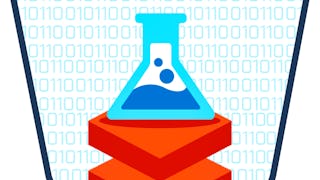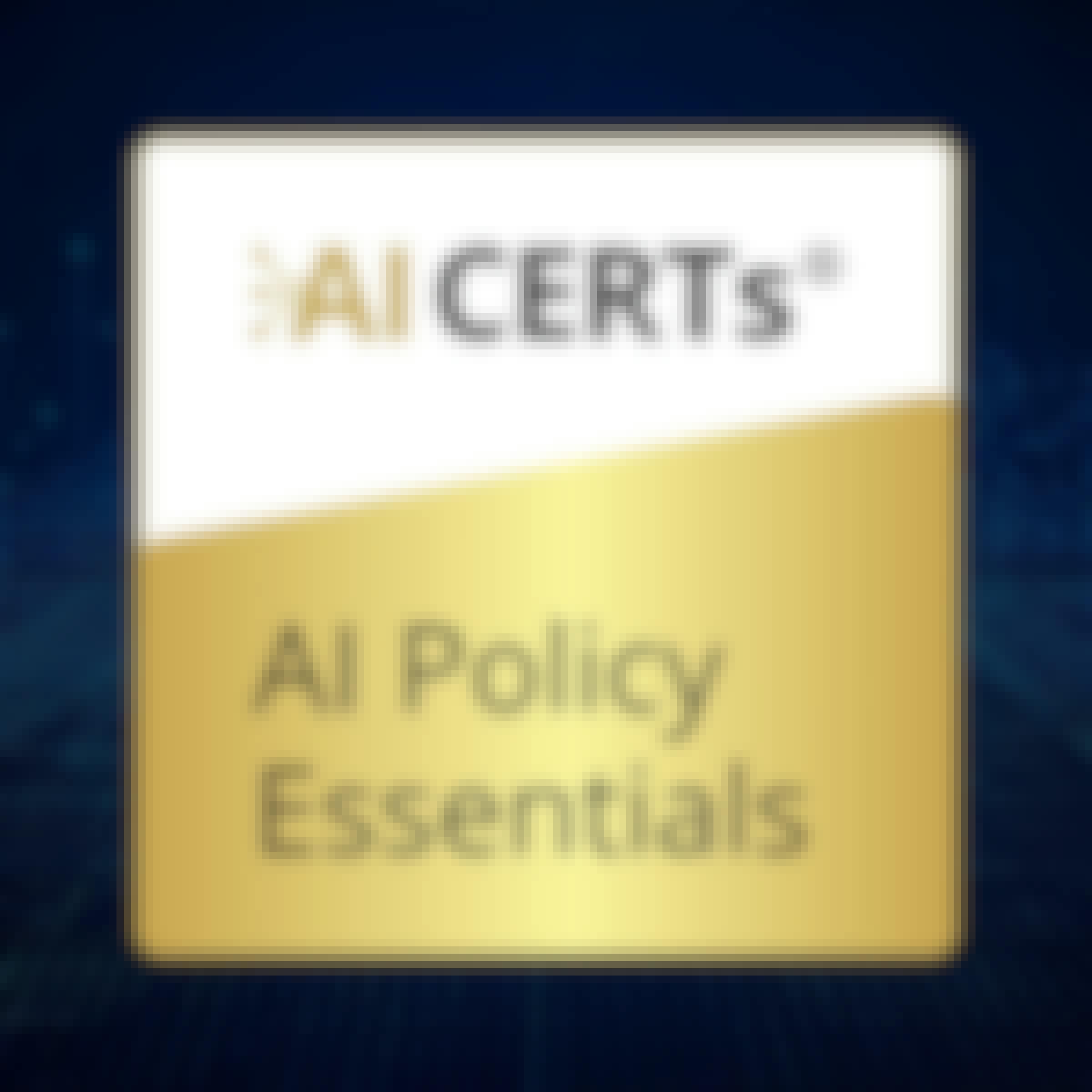- Browse
- Deep Learning
Deep Learning Courses
Deep learning courses can help you learn neural networks, convolutional networks, and recurrent networks, along with their applications in image recognition and natural language processing. You can build skills in model training, hyperparameter tuning, and performance evaluation, which are crucial for developing effective AI solutions. Many courses introduce tools like TensorFlow and PyTorch, allowing you to implement algorithms and optimize models, making your learning experience hands-on and relevant to current industry practices.
Popular Deep Learning Courses and Certifications
 Status: Free TrialFree TrialU
Status: Free TrialFree TrialUUniversity of Pennsylvania
Skills you'll gain: Customer Analysis, Data-Driven Decision-Making, Descriptive Analytics, Marketing Analytics, Predictive Analytics, Customer Insights, Business Analytics, Analytics, Consumer Behaviour, Process Optimization, Data Collection, Regression Analysis, Market Research
4.6·Rating, 4.6 out of 5 stars12K reviewsMixed · Course · 1 - 3 Months
 Status: Free TrialFree Trial
Status: Free TrialFree TrialSkills you'll gain: PySpark, Databricks, Apache Spark, MLOps (Machine Learning Operations), Microsoft Azure, Big Data, Data Processing, Deep Learning, Data Transformation, Model Deployment, Machine Learning Software, Model Evaluation, Machine Learning, Distributed Computing, Exploratory Data Analysis, Regression Analysis
3.1·Rating, 3.1 out of 5 stars79 reviewsIntermediate · Course · 1 - 3 Months
 Status: PreviewPreviewU
Status: PreviewPreviewUUniversity of Illinois Urbana-Champaign
Skills you'll gain: Teaching, Differentiated Instruction, Pedagogy, Instructional Strategies, Human Learning, Cultural Diversity, Research, Student-Centred Learning, Media and Communications, Curriculum Development
4.5·Rating, 4.5 out of 5 stars118 reviewsBeginner · Course · 1 - 4 Weeks
 Status: PreviewPreview
Status: PreviewPreviewSkills you'll gain: Predictive Modeling, Predictive Analytics, Marketing Analytics, Statistical Machine Learning, Machine Learning, Data Science, Applied Machine Learning, Model Evaluation, Statistical Analysis
4.7·Rating, 4.7 out of 5 stars9 reviewsAdvanced · Course · 1 - 4 Weeks
 Status: NewNewStatus: Free TrialFree Trial
Status: NewNewStatus: Free TrialFree TrialSkills you'll gain: Internet Of Things, Natural Language Processing, Telecommunications, Artificial Intelligence and Machine Learning (AI/ML), Automation, Network Performance Management, Network Monitoring, Data Pipelines, Generative AI Agents, Generative AI, Wireless Networks, Artificial Intelligence, Emerging Technologies, Network Architecture, Digital Communications, Computer Networking, Network Protocols, Responsible AI, Communication, System Design and Implementation
Beginner · Course · 1 - 4 Weeks
 Status: PreviewPreviewU
Status: PreviewPreviewUUniversidad Nacional Autónoma de México
Skills you'll gain: Learning Strategies, Learning Theory, Human Learning, Quick Learning, Self-Motivation, Lifelong Learning, Literacy, Mental Concentration, Willingness To Learn, Cognitive flexibility, Critical Thinking, Productivity, Personal Development, Self-Awareness, Growth Mindedness, Goal Setting
4.9·Rating, 4.9 out of 5 stars5.5K reviewsMixed · Course · 1 - 4 Weeks
 Status: Free TrialFree TrialU
Status: Free TrialFree TrialUUniversity of California, Irvine
Skills you'll gain: Grammar, English Language, Vocabulary
4.8·Rating, 4.8 out of 5 stars743 reviewsIntermediate · Course · 1 - 4 Weeks
 Status: Free TrialFree Trial
Status: Free TrialFree TrialSkills you'll gain: Data Warehousing, Database Administration, SQL, Extract, Transform, Load, Apache Airflow, Relational Databases, Linux Commands, Database Design, IBM Cognos Analytics, Database Management, MySQL, Data Pipelines, Apache Kafka, Bash (Scripting Language), Database Architecture and Administration, Shell Script, Data Store, IBM DB2, Data Visualization, Dashboard
4.7·Rating, 4.7 out of 5 stars6.7K reviewsBeginner · Professional Certificate · 3 - 6 Months
 Status: NewNewStatus: Free TrialFree Trial
Status: NewNewStatus: Free TrialFree TrialSkills you'll gain: Power BI, Data Modeling, Data Analysis Expressions (DAX), Data Transformation, Data Manipulation, Data Processing, Big Data, Interactive Data Visualization, Business Intelligence, Data Visualization Software, Data Integration, Time Series Analysis and Forecasting
Intermediate · Course · 1 - 4 Weeks
 Status: NewNewStatus: Free TrialFree Trial
Status: NewNewStatus: Free TrialFree TrialSkills you'll gain: Financial Modeling, Financial Forecasting, Financial Statements, Depreciation, Balance Sheet, Capital Budgeting, Financial Analysis, Excel Formulas, Income Statement, Microsoft Excel, Risk Analysis, Data Storytelling, Data Validation, Cash Flows, Data Presentation, Return On Investment, Pivot Tables And Charts
Beginner · Course · 1 - 3 Months
 Status: PreviewPreviewU
Status: PreviewPreviewUUniversity of Illinois Urbana-Champaign
Skills you'll gain: Instructional and Curriculum Design, Needs Assessment, Instructional Design, Learning Theory, Diversity and Inclusion, Training and Development, Education and Training, Curriculum Development, Analysis
4.1·Rating, 4.1 out of 5 stars849 reviewsMixed · Course · 1 - 3 Months
 Status: NewNewStatus: PreviewPreviewA
Status: NewNewStatus: PreviewPreviewAAI CERTs
Skills you'll gain: Policy Development, Cyber Governance, Governance, Policty Analysis, Research, and Development, Data Governance, Public Policies, Regulation and Legal Compliance, Policy Analysis, Artificial Intelligence, Governance Risk Management and Compliance, Artificial Intelligence and Machine Learning (AI/ML), Business Ethics, Economics, Policy, and Social Studies, Social Impact, Generative AI Agents, Generative AI, Business Economics
Beginner · Course · 1 - 3 Months
In summary, here are 10 of our most popular deep learning courses
- Customer Analytics: University of Pennsylvania
- Perform data science with Azure Databricks: Microsoft
- Literacy Teaching and Learning: Aims, Approaches and Pedagogies: University of Illinois Urbana-Champaign
- Four Rare Machine Learning Skills All Data Scientists Need: SAS
- AI Foundations & Industry Overview for Telecommunication: AI CERTs
- Aprender: Universidad Nacional Autónoma de México
- Conjunctions, Connectives, and Adverb Clauses: University of California, Irvine
- IBM Data Warehouse Engineer: IBM
- Power BI Essentials and Advanced Techniques: Packt
- Master Financial Modeling with Excel & AI: Analyze Forecast: EDUCBA










